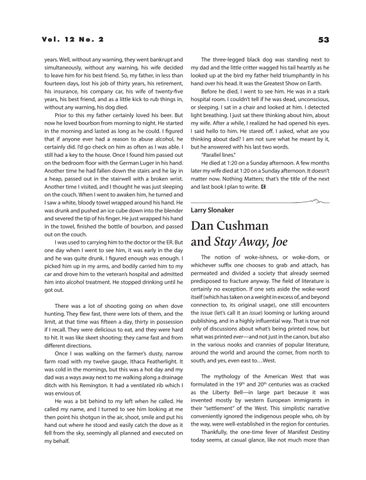53
V o l . 12 N o . 2 years. Well, without any warning, they went bankrupt and simultaneously, without any warning, his wife decided to leave him for his best friend. So, my father, in less than fourteen days, lost his job of thirty years, his retirement, his insurance, his company car, his wife of twenty-five years, his best friend, and as a little kick to rub things in, without any warning, his dog died. Prior to this my father certainly loved his beer. But now he loved bourbon from morning to night. He started in the morning and lasted as long as he could. I figured that if anyone ever had a reason to abuse alcohol, he certainly did. I’d go check on him as often as I was able. I still had a key to the house. Once I found him passed out on the bedroom floor with the German Luger in his hand. Another time he had fallen down the stairs and he lay in a heap, passed out in the stairwell with a broken wrist. Another time I visited, and I thought he was just sleeping on the couch. When I went to awaken him, he turned and I saw a white, bloody towel wrapped around his hand. He was drunk and pushed an ice cube down into the blender and severed the tip of his finger. He just wrapped his hand in the towel, finished the bottle of bourbon, and passed out on the couch. I was used to carrying him to the doctor or the ER. But one day when I went to see him, it was early in the day and he was quite drunk. I figured enough was enough. I picked him up in my arms, and bodily carried him to my car and drove him to the veteran’s hospital and admitted him into alcohol treatment. He stopped drinking until he got out. There was a lot of shooting going on when dove hunting. They flew fast, there were lots of them, and the limit, at that time was fifteen a day, thirty in possession if I recall. They were delicious to eat, and they were hard to hit. It was like skeet shooting; they came fast and from different directions. Once I was walking on the farmer’s dusty, narrow farm road with my twelve gauge, Ithaca Featherlight. It was cold in the mornings, but this was a hot day and my dad was a ways away next to me walking along a drainage ditch with his Remington. It had a ventilated rib which I was envious of. He was a bit behind to my left when he called. He called my name, and I turned to see him looking at me then point his shotgun in the air, shoot, smile and put his hand out where he stood and easily catch the dove as it fell from the sky, seemingly all planned and executed on my behalf.
The three-legged black dog was standing next to my dad and the little critter wagged his tail heartily as he looked up at the bird my father held triumphantly in his hand over his head. It was the Greatest Show on Earth. Before he died, I went to see him. He was in a stark hospital room. I couldn’t tell if he was dead, unconscious, or sleeping. I sat in a chair and looked at him. I detected light breathing. I just sat there thinking about him, about my wife. After a while, I realized he had opened his eyes. I said hello to him. He stared off. I asked, what are you thinking about dad? I am not sure what he meant by it, but he answered with his last two words. “Parallel lines.” He died at 1:20 on a Sunday afternoon. A few months later my wife died at 1:20 on a Sunday afternoon. It doesn’t matter now. Nothing Matters; that’s the title of the next and last book I plan to write.
Larry Slonaker
Dan Cushman and Stay Away, Joe The notion of woke-ishness, or woke-dom, or whichever suffix one chooses to grab and attach, has permeated and divided a society that already seemed predisposed to fracture anyway. The field of literature is certainly no exception. If one sets aside the woke-word itself (which has taken on a weight in excess of, and beyond connection to, its original usage), one still encounters the issue (let’s call it an issue) looming or lurking around publishing, and in a highly influential way. That is true not only of discussions about what’s being printed now, but what was printed ever—and not just in the canon, but also in the various nooks and crannies of popular literature, around the world and around the corner, from north to south, and yes, even east to…West. The mythology of the American West that was formulated in the 19th and 20th centuries was as cracked as the Liberty Bell—in large part because it was invented mostly by western European immigrants in their “settlement” of the West. This simplistic narrative conveniently ignored the indigenous people who, oh by the way, were well-established in the region for centuries. Thankfully, the one-time fever of Manifest Destiny today seems, at casual glance, like not much more than
